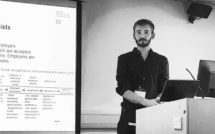

The 24th International Conference of Europeanists, held at the University of Glasgow, consisted of a set of panels and events discussing the sustainability and transformation of the European Union over a three-day conference. ValEUR’s Mini Symposium on the first day of the Conference began with the discussion of the role of values in EU Governance, focusing specifically on the value of human dignity. Oriane Calligaro, from the Universite libre de Bruxelles, began the discussion by introducing the speakers, also introducing human dignity as one of the fundamental values of the European Union enshrined in the Treaty.
Introductory remarks were given by discussant Francois Foret, also from the Universite libre de Bruxelles, who provided a broad introduction presenting how we analyze values generally, and the clashes of interpretation often found, especially within the European Union with its “beacon of values.” Foret stated that the clash of our interpretation refers to the “denaturalization of our values,” and discussed several factors contributing to this, including the evolution of the constitutional process in using different principles as core of the European Community, the financial economic crisis whereby the EU became deprived of its usual legitimization rendering the normative foundations of the political order under question, and a third factor of internal and external threats challenging our European values.
He then explained that the effect of values depends on how they are implemented within a political order; they can act either as a container of political conflict or as political obstacles. It is where governing is done by values whereby the values are presented as obstacles, which is what can often lead to resistance and dissent.
The next panellist, Jim Drowet, Secretariat of the European Group on Ethics in Science and New Technologies introduced human dignity as an unfolding story of perplexity. He discussed his paper about epistemology and ethical values, beginning with a list of questions with the underlying message that we do not have any concrete information about the meaning, origin, or effect of human dignity. Describing the Fundamental Charter provision regarding human dignity, he stated, “it says a lot but at the same time it doesn’t say much.”
Drowet related the European concept of human dignity to that in the German basic code and its eerie similarities, and the concrete consequences on the many facets of German property. He raised the Omega case, whereby laser games were banned due to infringement of the fundamental value of human dignity enshrined. Another example raised was the Aviation Security Act passed in Germany following the 9/11 attacks; a provision allowing armed forces to shoot down planes in case of terrorist hijacking was declared unconstitutional; again on grounds of human dignity with the rationale being that killing a small amount of innocent people to save a larger number could not be legalized, since it treats dignity as if it was a measurable and limited quantity.
Drowet goes back to the origin of human dignity and explains the Latin origin of the word dignitus, meaning merit, but the root of dignity in the classical sense was related to honorability and public office: aristocratic and inequalitarian, which stands in stark opposition to the contemporary idea currently associated with the meaning of human dignity as encapsulating democratic, egalitarian times.
A point repeated several times throughout the symposium was the idea of the value of human dignity being like a black box. Drowet states it is a subject in which there prevails an agreement not to unpack it and there is essentially “consensus not to go there,” but interestingly invites the audience to open it. He states it to be an essentially uncontested concept, “a pact of non-questioning,” but still asks us to consider human dignity beyond humans, beyond its classical values; to consider the dignity of the unborn, the dead, animals, plants, all the way through to ideas. He uses two examples to illustrate why it is important that we do this: the example of animal transplantation in humans and the example of humans with robotic arms or robots with human tissues, where does the line get drawn as to whether they are “human enough” to fall under the category of human dignity? He ends it with the assertion that due to these blurred lines, it is essential that we have an ongoing policing of the boundaries of community values because otherwise we may end up in more trouble than we planned for.
The last speaker discussing her paper was PhD researcher Emilie Mondo, describing the role of human dignity in EU Bioethics Politics. Mondo gave a brief introduction of the growing politicization of values at EU level and the morality issues caused by political, social, and religious actors with such diverse opinions. She questioned whether the EU culture requirement for compromise is able to meet this ideological difference or whether the “EU motto united in diversity is put in distress by the irreconcilable positions.”
She focused on the role of fundamental values in EU morality politics, emphasizing the role of human dignity in EU bioethics politics, paying homage to two politically sensitive issues of abortion and hESCR. She described the discourses that actors developed in the abortion and human Embryonic Stem Cell Research (hESCR) debates, with interest groups and various other organizations on one hand and European parliament actors on the other. Interestingly, she mentioned Eurospeak and how such groups frame their concerns in the context of EU politics, and that human dignity conforms to Eurospeak by sustaining a secular, human rights discursive repertoire but also enables actors to defend specific view in order to make their claims more easily accessible and visible at EU level.
The discussion was led back to the lack of definition, but Mondo perceived it as a positive. The lack of definition, she stated, created a flexibility in the value which could be considered a political asset in the search for consensus. The very broadness and vagueness helps cement loose and internally diverse views governed around a common purpose, because despite their differences, the different actors still are committed to respecting the values of human dignity. Mondo referred to the “schizophrenic nature” of human dignity, due to the “balance between ethicisation and technicisation,” as both a consensual and divisive value, with the ideological tensions underlying the schizophrenic concept mirroring that nature.
The panel was then opened to the floor and the audience engagement included questions regarding the epistemology of human dignity: who is the holder of the values? A particularly fascinating point raised by a member of the audience was elaboration on the black box concept, relating it to solidarity and the current refugee crisis as a paradigmatic case of the contested value of human dignity. If we open the box, we may realize we do not in fact agree and the very fundamental values of the European Union may fall into question. The role of memory in opening the black box was also specifically addressed, using Germany as an example.
“Human dignity,” Drowet makes the comparison, is “what the precautionary principle was in the 90s, and dignity is becoming the symbol of Europe in the European Framework of values.”
Shumail Javed is a fourth year law student at the University of Glasgow.
Photo: University of Glasgow, Glasgow, United Kingdom, Alvin Leong | Flickr
Published on July 13, 2017.




